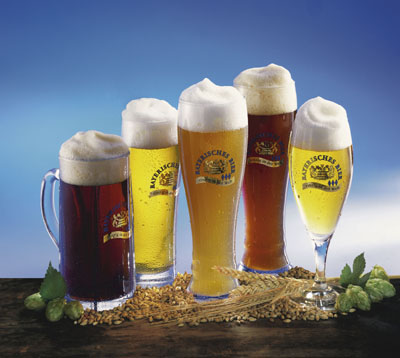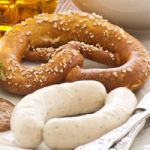 |
The cuisine of Bavaria > Munich's Oktoberfest
You cannot speak of the big celebrations that mark the return of autumn without mentioning Munich, where the whole thing began… at least in its modern version. It all goes back to October 12, 1810 when Crown Prince Ludwig of Bavaria and Theresa of Sachsen-Hildburghausen were married in great ceremony. The public celebrations included horse races, shooting contests and balloon rides. Everyone had such a good time that it was repeated the next year when an agricultural fair was made part of the “Oktoberfest.” Five years later, the government permitted Munich brewers to set up tents to sell their beer – Oktoberfest had quickly established itself as an annual tradition. These days over 5 million liters of beer are sold each year as inhabitants of Munich and other parts of Bavaria put on their lederhosen and traditional hats and join in the festivities. During this party season, people even walk differently… revelers’ gaits take on a slightly nautical pitch, even though they’re far from the sea! But how could it be otherwise, when beer is sold only in 1 liter mugs (the famous “Mass”) and extra hops are added for the occasion?
Besides the drinking, there’s also a lot of eating that goes on: sausages, sauerkraut and pork hocks… But of course, where there’ s beer, there are snacks. “Burnt” almonds (caramelized in sugar) are a favorite nibble, with every seller claiming his recipe is the best.

Germans are rightly proud of their beer... or should we say "beers," because there are some 5,000 of them!
In general, but especially in northern Germany, light Pilsener with little hops is favoured. Even in Dortmund it has displaced the classic export beer. An amber colored Alt (a top-fermented dark beer) is popular in Düsseldorf and in the Lower Rhine valleys. In Cologne people drink light yellow Kölsch which is brewed with lots of hops and served in "Stangen" (straight narrow glasses). Further south, lager with more malt predominates. This is also the home of "white beer," a light, highly effervescent, top-fermented beer that is slightly cloudy due to the yeast. Under the name "Weizen" it is rapidly gaining friends further north.
Black beer, served in an elegant tulip glass, is starting to regain its former popularity. This very old beer is brewed mainly in regions of the former East Germany: Thuringia and Saxony, as well as in Mecklenburg-Vorpommern. An unbroken tradition, however, is enjoyed by the Rauchbier (smoked beer) which is brewed in Bamberg. It has a unique ham flavor because the malt that is used is dried over an open fire.
Weihenstephan, the world's oldest brewery, is located in Freising, a town near Munich. As early as 1040 monks were brewing beer here. But for special occasions the dukes of Bavaria ordered Bock beer (strong beer) from Einbeck near Hanover. Even today it's the tradition in Munich to open the strong beer season with a specially brewed Doppelbock (extra strong beer).
Extremely light, on the other hand, is the Berliner Weiße (a lager) which is sweetened with woodruff or raspberry syrup. It glows either green or red in a stemmed ball-shaped glass. However, if you want something less intoxicating, why not have a "Radler" or "Alster Wasser" (types of shandy in the south and north respectively)? This is a fifty-fifty combination of beer and lemonade. It is deliciously refreshing and guarantees you can drink more. Up until 1993 these drinks were not allowed to be pre-mixed prior to serving. But now you can get them in bottles just like "Diesel" (beer with cola).
German beer, however, is still brewed as the law has stipulated since 1516: from malt, water, hops and yeast – and nothing else!


Phostos : Bayerisches Staatsministerium für Landwirtschaft und Forsten - www.food-from-bavaria.de

-

 Recipes
Recipes
-

 Products
Products
-

 Entertaining
Entertaining
-

 Chefs
Chefs
-

 Hints & Tips
Hints & Tips
-

 Glossaries
Glossaries








